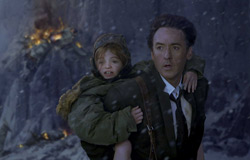As yet another apocalyptic epic hits the big screen this week—Sony Pictures’ 2012 opens Friday—pastors and pundits are weighing in on the discussion about the end times.
The film focuses on the date Dec. 21, 2012, when the ancient Mayan calendar officially expires—prompting some prophets to predict doomsday. And some people are scared.
“I get letters and calls every day from people saying, ‘Is this it?'” says Jerry Jenkins, co-author of the end-times Left Behind books. “Everything we dramatized in the Left Behind books—the one-world government, one-world currency, threats against Israel—here it is on our doorstep. It’s alarming and I think it should be.”
Others insist there’s no cause for alarm. Instead, Christians should be calling for sanity, says Scot McKnight, Professor in Religious Studies at North Park University.
“We have the opportunity to witness to the sanity of biblical eschatology by soaking ourselves in Israel’s prophets, Jesus, and early Christian eschatology,” says McKnight. “Jesus warned us about setting times and pretending to know what is not ours to know. Our responsibility is to be faithful to the tasks to which we are called and let God wrap up history when he so chooses.”
Some pastors are seeing the film’s release as an opportunity to start conversations about faith, the end times, and “the real facts of the Second Coming,” as Dudley Rutherford, pastor of Shepherd of the Hills Church in Porter Ranch, Calif., puts it.
“The Bible makes it clear that no one knows day or the hour,” Rutherford says. “You can know the season when Jesus is coming back, but anytime someone makes a prophecy that this is the day, I know it’s not the day.”

In the movie, John Cusack plays an L.A. limo driver and struggling sci-fi writer who saves his family from cataclysmic disasters beginning Dec. 21, 2012—the day the Mayan’s 5,125-year “Long Count” calendar ends. On that day in the film, a solar storm results in changes in the Earth’s core, crust and atmosphere, triggering gigantic earthquakes, super-volcanoes, and other Brobdingnagian-size disasters.
David Morrison, a senior scientist at NASA’s Astrobiology Institute who hosts the web-based “Ask an Astrobiologist,” has received thousands of questions from people asking whether these are the last days. He tells them the Mayan doomsday predictions—fueled by websites, talk radio, and books—are a hoax.
“I’ve even coined a term for all this—cosmophobia, a fear of the cosmos,” Morrison says. “My main concern is not the movie, but the thousands of people who have written me from all over the world who are genuinely frightened about 2012 and think the world is going to end.”
Hollywood-ized
Scholars say the ancient Mayans viewed the end of the 5,125-year cycle—the last of five great cycles spanning nearly 26,000 years—as a time of “destruction and renewal,” but they didn’t specify what would happen.
“It’s been Hollywood-ized,” says Eleanor Harrison-Buck, a Mayan expert and an assistant professor of archeology at the University of New Hampshire. “It taps into our own fear of collapse and the idea that the world might come to an end.”

Jesus predicted that false prophets would arise and deceive many people, says Tim LaHaye, co-author of the Left Behind series, which sold more than 65 million copies. LaHaye believes the 2012 mania is distracting people from what the Bible predicts regarding the Rapture, Tribulation and Second Coming.
“The date has been picked up by so many groups and cults that you have to conclude that someone or something inspired all these writers to come to essentially the same period—and that would be divination or spiritism,” LaHaye says. “It’s probably satanic because there is nothing in the Bible about it. In fact, the Bible forbids us to even think about a day and an hour.”
Mark Hitchcock, pastor of Faith Bible Church in Edmond, Okla. and author of 2012: The Bible and the End of the World, blames the “New Age movement” for the quasi-hysteria. “It’s the eschatology of the New Age. It’s basically a mystical, New Age belief system that I believe is spiritual deception. I want to take 2012 and bend the curve to God’s purposes, and use this as a springboard to tell people what the Bible says.”
How it all started
The 2012 worries began when Frank Waters wrote about Mayan cycles in his 1975 book Mexico Mystique: The Coming 6th World of Consciousness. In 1987, Jose Arguelles’ The Mayan Factor unraveled the “harmonic code” of the ancient Maya; that same year, Arguelles and his followers initiated the Mayan-Galactic Harmonic Convergence, bringing together people at sacred sites around the globe to usher in a 25-year countdown to a new cosmic consciousness in 2012. In 1995, author John Major Jenkins, whom Newsweek says “helped usher in this craze,” wrote Maya Cosmogenesis 2012, claiming a rare galactic alignment in 2012 will result in “the birth of a new age.”
This “apocalyptic subculture” is flooding society with books, websites, YouTube videos and movies at a time of growing fears—about terrorism, al Qaeda, Iran, nuclear weapons, North Korea, and more. Not to mention depletion of vital resources, food shortages, climate change, disease pandemics, the economic meltdown, and massive debt.
End-times sky watchers and wannabe prophets have long pointed to “signs” that doomsday is near—but not one of them has been right.
“Listen to the history of humans for the last 2,000 to 3,000 years,” says McKnight, “and you will see that very, very rarely does a prophet turn out to be a real prophet. These theories and speculations about history coming to a close have always proven to be wrong.”
Richard J. Mouw, president and professor of Christian philosophy at Fuller Theological Seminary in Pasadena, Calif., says he has “mixed feelings about the Mayan thing,” but that he understands people’s curiosity about what comes next.
“We humans have been created with a desire for something more than that which is available in this present life,” he says. “In difficult times, this restlessness for ‘more’ comes to the surface. These are difficult days in the world, and it should not surprise us that yearnings for eternity—for a final resolution of all the struggle with Good and Evil—will come to pass.
“Doomsday thinking is not all bad. But the important questions are, ‘How do we explain all the bad stuff?’ and ‘What would a lasting remedy look like?’ People of faith need to think deeply about how to answer those questions intelligently. If we don’t, then we are leaving to the crazies to offer guidance to people who are genuinely disturbed by what is happening in their lives.”
Esoteric, vague predictions
Hugh Ross, an astronomer and president of Reasons to Believe, a Glendora, Calif.-based science-faith think tank, recently posted a Response to 2012 on his website. He says doomsayers have long alleged the Mayan, Incan and Egyptian calendars predicted a specific, imminent date for the world’s end—and that over a half dozen such dates have come and gone.
“If you look closely at these occult calendars and prognosticators of doom—like Nostradamus and Edward Cayce—every one of their predictions are esoteric and vague, and you can literally drag any date you want from them,” Ross says. “The Bible says the end will come one day, but it also makes it clear it cannot happen until certain things take place first.”
Certain things, says Ross, like Jesus’ prophecy in Matthew 24 that the gospel will be preached to the whole world “and then the end will come.” (Some mission agencies expect the gospel to reach the world’s 6,000 people groups within a decade.)
It’s best not to know
Ben Witherington, a New Testament prof at Asbury Theological Seminary, says it’s good that we don’t know when doomsday will occur.
“God reveals enough of the future to give us hope, but not so much that we do not have to live by faith each and every day,” he says. “The very reason God has not revealed the timing of Christ’s return or the end of the world is precisely because we would cease living day by day and start making calculations about what we want to do between now and then—including, for example, going on a sinning spree and repenting at the last possible moment.God has told no one the timing of the end for good reasons.
“It is one thing to have great expectations, another thing to have the hubris to make calculations and then prognostications on the assumption that we have enough information, or have read the signs of the time accurately enough to do so.What we know about all such prognosticators from Nostradamus to now is they have had a 100 percent failure rate in predicting the end of all things.When you have that sort of failure, it’s clear we do not know enough to make such predictions, and should stop trying.”
Witherington concludes: “We should live each day like the wise virgins of Jesus’ parable—always prepared, whether Jesus returns sooner or later.The Mayans no more knew when the end would come than anyone else does.It’s time for theological weather forecasting to be given up entirely. Even TV weathermen predicting ordinary events are more accurate.”
Troy Anderson is a reporter for the
Los Angeles Daily News
.Copyright © 2009 Christianity Today. Click for reprint information.










